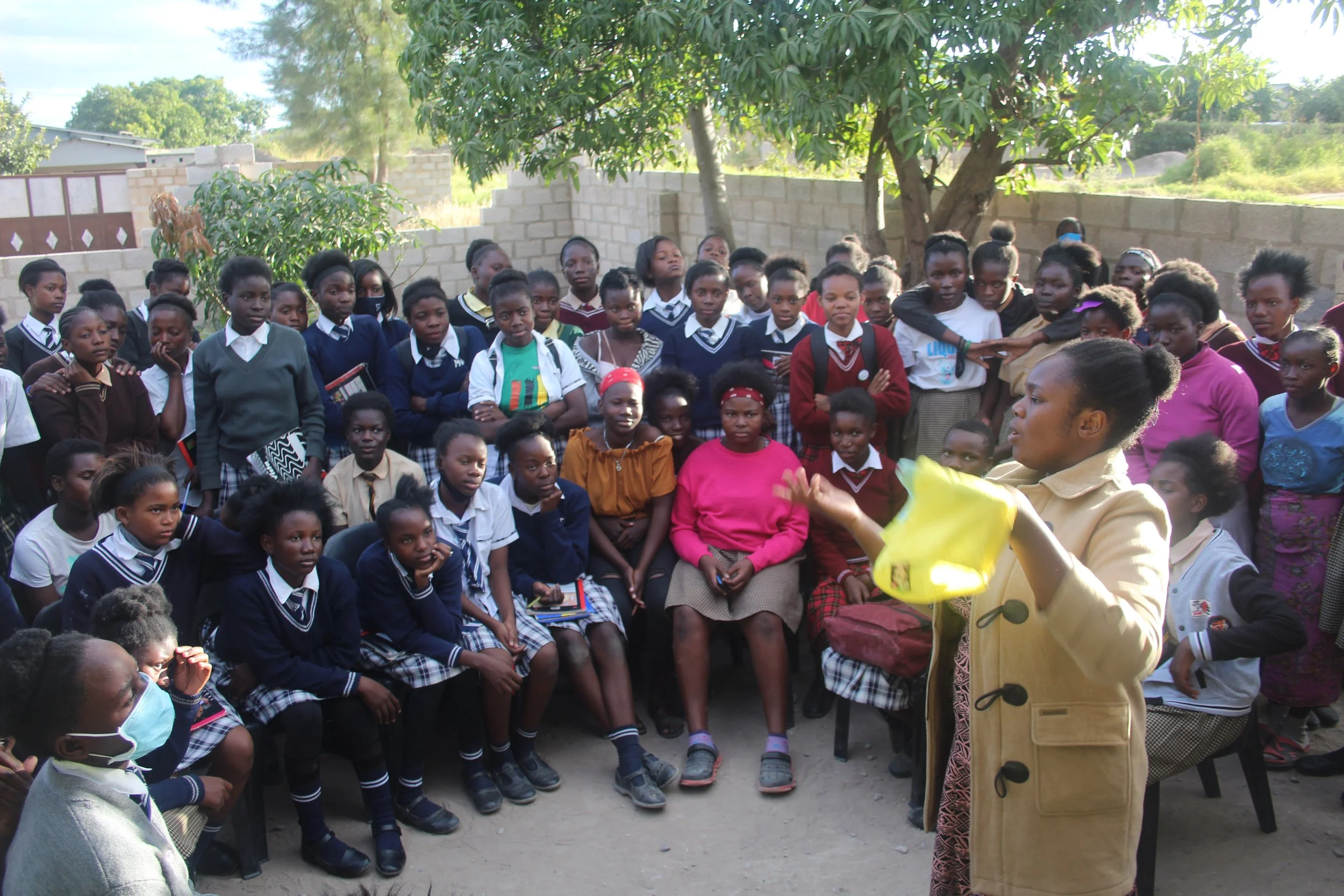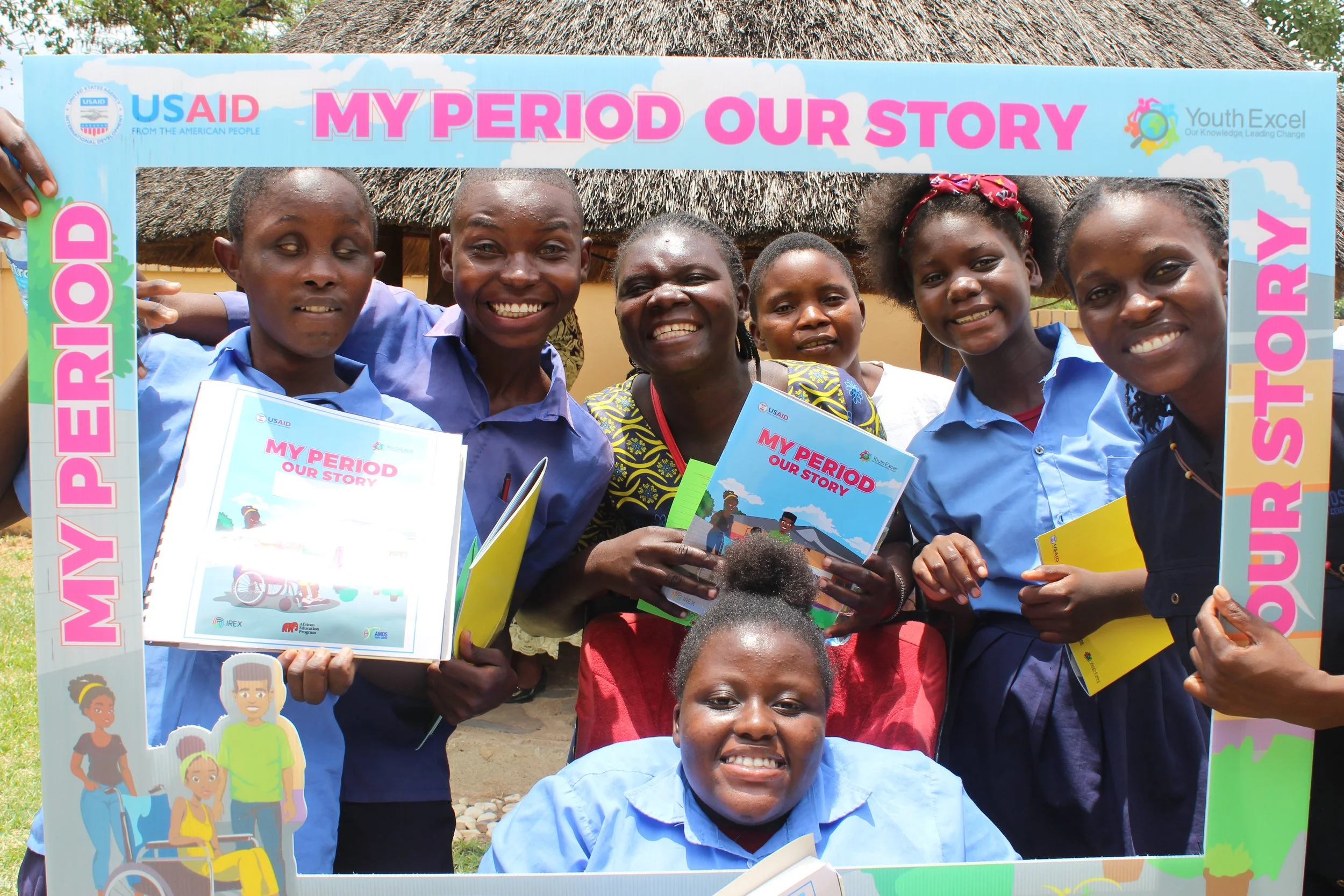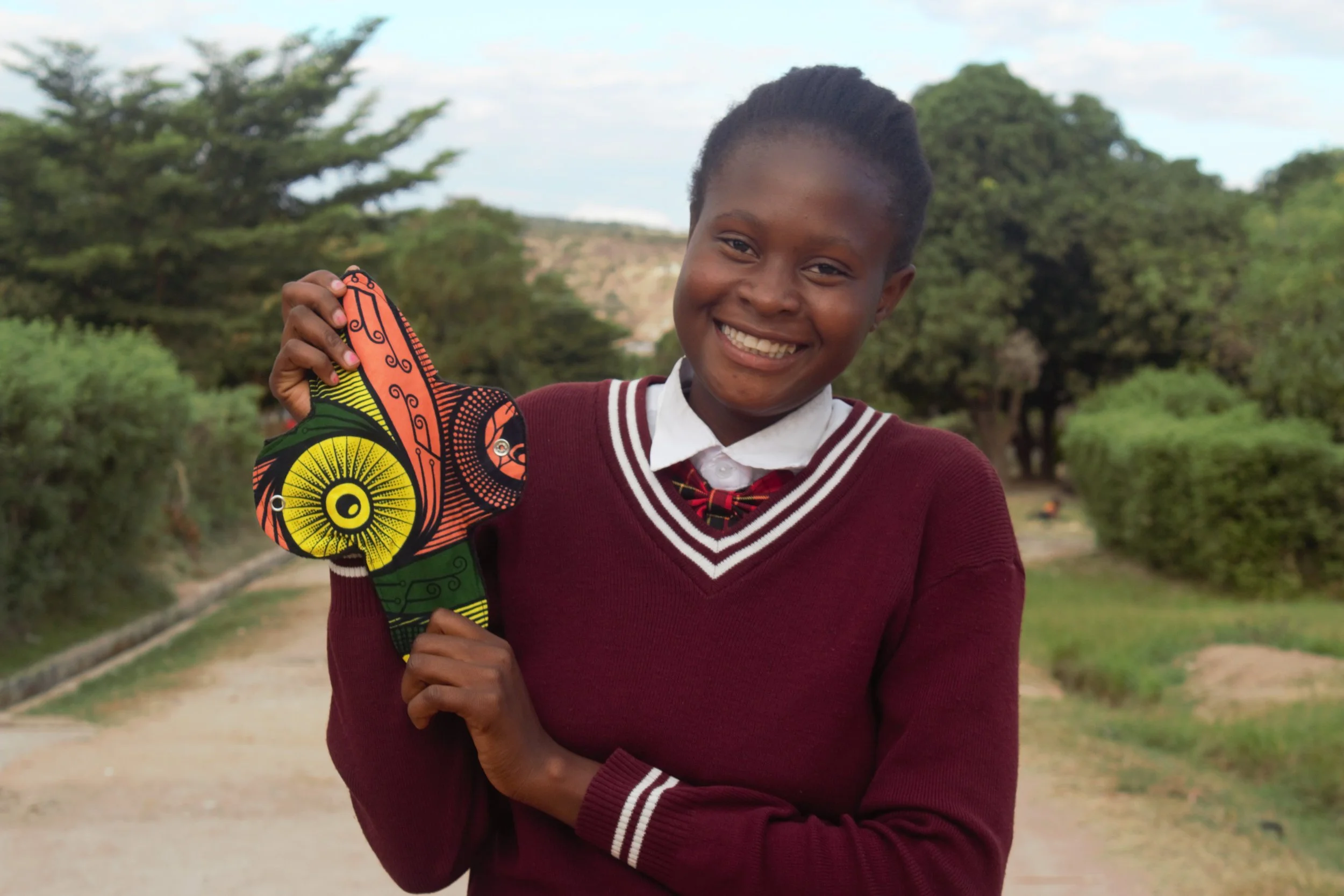Equipped to Thrive: The Menstrual Health Movement at Amos Youth Centre
By Annabel Mumba
Annabel Mumba is AYC’s Donor Relations Coordinator in Zambia. She is a Scholarship Fund recipient, high school graduate and current college student, and also one of our Success Stories.
Co-written by Pamela O’Brien, African Education Program’s Development Director, who is mentoring Annabel as she pursues a journalism degree.
Students gather for a menstrual health session.
At the Amos Youth Centre, periods are no longer a source of shame, silence, or struggle—they are becoming a symbol of strength, knowledge, and self-worth. Through our Reproductive Health Access Initiative (RHAI), girls and young women are gaining access to menstrual products, accurate reproductive health information, and the emotional support they need to grow with confidence.
But RHAI’s impact goes beyond just the girls—it touches families too. Mothers, caregivers, and mentors are witnessing the transformation in their daughters, not only in how they manage their periods, but in how they view themselves and their futures.
In this blog, we highlight three powerful stories:
Sekela, a young girl from our Read for Rose Special Education Program living with spina bifida and hydrocephalus, who began menstruating at just 9 years old.
Veronica, an 18-year-old from our Learning & Leadership Centre who has tried all of our menstrual products.
Modester, a university student and alumnus of our Learning & Leadership Centre who has attended holistic programs for over 8 years, showing the long-term impact of sustained reproductive health support.
These stories reflect the deep, personal, and lasting change RHAI is making, not just for individuals, but for families and communities.
Sekela’s Story: I Was Ready Because I Was Taught
At just 11 years old, Sekela speaks with a clarity and confidence that surprises many adults. When she began menstruating at the early age of 9, she wasn’t afraid or confused. She was ready.
Sekela and her friends at Read for Rose display period underwear during a menstrual health session.
Sekela lives with hydrocephalus and spina bifida—specifically myelomeningocele, the most severe form of the condition—which has left her paralyzed from the waist down. Despite this unique circumstance, Sekela embraced her menstrual journey with strength and curiosity. Her mother, a hardworking single woman who sells scones and vegetables at the local market, first noticed the physical signs that Sekela had begun menstruating. But it was Sekela herself who truly understood what was happening, thanks to the preparation she received from her second home: the Read for Rose Special Education Program.
"Teacher Febby told me that I would have my period someday and that I should be prepared," Sekela recalls. Through the Read for Rose Special Education Program where she is a student, Sekela had been learning about menstruation alongside her peers in weekly health sessions. These lessons—led by Febby Choombe, the Director of Special Education—became a space of openness, education, and emotional safety. Even before her first period, Sekela came to each session full of questions and excitement. “I was eager. I wanted to understand my body,” she says.
In 2023, Sekela received her first menstrual product kit through the Reproductive Health Access Initiative (RHAI). The kit included six reusable pads and a menstrual cup. With detailed training from the team, Sekela went home and taught her mother everything she had learned. Her mother was moved. “I was very happy when she came to me and told me everything,” she shared. “She presented her products so confidently. I even called Teacher Febby to thank her. It felt like Sekela had been empowered in ways I couldn’t have imagined.”
Sekela celebrated the launch of the ‘My Period, Our Story’ storybook with her friends.
Though she doesn’t experience menstrual cramps due to her condition, Sekela has gained an emotional awareness many girls her age are only beginning to understand. “I’ve learned that I get very emotional when I’m on my period,” she says. “But Teacher Febby told me it’s okay to feel that way.”
More than just managing her cycle, Sekela has found friendship and community. “She’s become empathetic and open with her friends, even those who experience challenges she doesn’t,” says Febby. “That’s the power of the RHAI program, equipping girls like Sekela with the right information and a sense of belonging.”
In 2024, Sekela received yet another product—period underwear, which has added comfort and flexibility to her monthly routine. Now, no matter what the month brings, she is prepared and confident.
She was also excited to see her peers at Read for Rose represented in the “My Period, Our Story” storybook created by AYC. This inclusive menstrual health and hygiene resource was created in print, braille and an audiovisual format for ALL students to better understand menstrual health and hygiene.
Madam Lulu assists with a menstrual health session at the Read for Rose Special Education Program where lessons are taught in sign language.
A Broader Impact
In the past five years, the Amos Youth Centre has distributed over 1,046 menstrual product kits to girls, young women, and mothers. This includes:
500 reusable pads
314 menstrual cups
32 period underwear
200 regular underwear (for those without any)
These products are more than materials—they’re tools of dignity, education, and empowerment. For girls like Sekela, they make all the difference.
Veronica’s Story: “My Period Is Our Story”
Veronica, an 18-year-old Grade 11 student at a local school in Kafue, remembers vividly the very first time she sat in a menstrual health session at the Amos Youth Centre. “My first session was very strange, but also very exciting,” she shares with a laugh. “No one had ever talked to me about periods before. I had only heard things from friends that you bleed every month and it honestly scared me.”
Veronica shows off one of her menstrual pads made out of Chitenge fabric.
At that time, Veronica hadn’t started menstruating yet. But those early sessions laid a foundation of knowledge and empowerment. It would be two years later that her first period would arrive, but by then, Veronica was not afraid. She was ready. “The Centre was the first place where I learned what really happens to girls during that time of the month,” she explained.
Through the Reproductive Health Access Initiative (RHAI), Veronica was among 200 girls in 2022 who received a menstrual health kit. Her kit included six reusable pads, a menstrual cup, and underwear. These were not just products; they were tools of dignity and confidence. When her first period came, Veronica told her mother, who bought her disposable pads and then took her to her grandmother’s home—a tradition in many Zambian families. “In our culture, it’s the role of grandmothers and aunties to teach girls about menstruation,” she said. “It’s called Umooye. My grandmother told me to be careful not to play with boys, or I would get pregnant.”
While Veronica treasures the guidance from her grandmother, it is her reusable pads that she holds most dear. “They are so comfortable,” she says with a smile. “Since 2022, I haven’t had to worry about where to get money for pads. I don’t have to bother my mother every month. My reusable pads are always ready.”
For Veronica, receiving her menstrual kit felt deeply personal. “I felt loved and important. These products have changed my life. I now look forward to each period because I have everything I need.” But the transformation hasn’t just been physical—it’s emotional and social too. Veronica said, “The sessions at the Centre have helped me understand my body, manage period pain, and control my emotions. I have a circle of friends at the Centre that I can talk to about anything.”
Most empowering of all is the shift in how she sees her own story. She shared, “Before, I believed my period should be a secret. But now I’m confident to have conversations with anyone—because my period is our story.” Veronica is also proud that boys are included in these sessions, noting, “I’m happy that boys learn with us. It means we’re all part of the change.”
When asked to describe the impact of the RHAI program in just two words, Veronica doesn’t hesitate: “Esteem building.” Because for her, that’s exactly what the Amos Youth Centre has done—built her self-esteem and her voice.
Modester’s Story: “No More Secrets—Only Confidence”
Modester shares that the reusable menstrual cup is a game changer.
Modester is a 23-year-old university student pursuing a Bachelor of Science in Plants and Environmental Studies from Copperbelt University. Her journey with the Amos Youth Centre began long before she stepped into lecture halls—back in Grade 7, in 2016, when a friend introduced her to what would become a second home. “There’s a place we go to with my friends,” her friend had said. “We play games, eat, learn, and make so many friends.” That simple invitation changed Modester’s life.
Along with her sister Mary, she began attending the Centre, not knowing that it would shape how she would come to understand herself, her body, and her voice. But before joining the Centre, Modester only heard whispers about menstruation—“secret talks” among girls who had already started. “It was like there was a passcode,” she recalls. “If you hadn’t started your period, you couldn’t be part of the conversation.”
But at the Centre, things were different. “The Centre taught me that I didn’t need a passcode to learn what was eventually going to happen to my body. I was prepared before it happened.” So when her period finally arrived, Modester was ready. “I already knew what to do. The Centre gave me lessons I didn’t even know I needed—about hygiene, emotions, and how to understand the most uncomfortable parts of myself.”
In the early days, the Centre provided her and her sister with disposable pads each month. But in an effort to become more sustainable, AYC turned to reusable menstrual pads and cups. It wasn’t until Modester received her menstrual cup that everything changed. “I swear by it, it’s the best thing that’s ever happened to me and my period,” Modester says with a smile. “Of course, it was terrifying at first. But with time, I adjusted. Now I use it every month.”
The menstrual cup has been a game changer, especially now that Modester is in university, balancing books, deadlines, and campus life. “I can wear the cup for more than ten hours without changing. With a normal pad, I’d have to change two to three times a day. I don’t have to worry about buying pads every month. I only have to worry about my grades.”
Beyond the products, Modester credits the Amos Youth Centre for helping her grow into herself. “I used to be timid. In high school, if I was on my period, I’d ask a friend to submit my book, I was so scared people would find out. But now, I’m confident in my own skin.” She is not just a beneficiary of the Reproductive Health Access Initiative—she’s now a leader. During her college breaks, Modester returns to AYC’s Learning & Leadership Centre to give back and leads tutoring sessions, teaching the very lessons that once shaped her. She has become a role model, not only to girls but to boys as well, proving that knowledge, dignity, and confidence are contagious.
Her mother echoes this transformation. “Both my daughters have received menstrual kits from AYC,” she said. “As a housewife, I couldn’t afford pads every month. A single pack costs about $1, and with five children to feed, that was too much. But the Centre filled in that gap.”
Now, with her menstrual cup, reusable pads, and the tools of self-knowledge, Modester moves through life with confidence and purpose. She is a symbol of what it means when girls are equipped, empowered, and educated.
Changing Her Story, One Period at a Time
From Sekela’s bravery to Veronica’s transformation and Modester’s leadership, these stories are more than just about menstruation, they are about dignity, access, and voice. The RHAI program at Amos Youth Centre and Read for Rose has created safe, informed, and empowering spaces where girls can learn, lead, and live without shame or fear.
When a girl is given the right information, the right products, and the right support system, she doesn’t just manage her period, she thrives. Every menstrual pad or cup distributed, every menstrual health session held, is a step toward ending period poverty, breaking silence, and building self-esteem.







